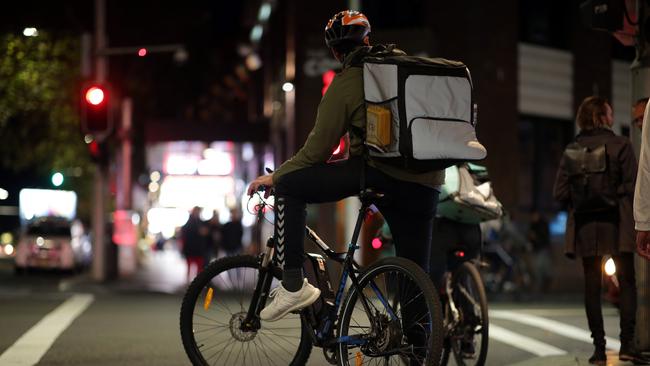Hungry Panda delivery service shortchanges riders, inquiry hears
UK-based Hungry Panda raised $70m last year to continue its global expansion, as Australian riders were paid just $3 per trip.

UK-based food delivery company Hungry Panda raised $70 million last year to continue its global expansion but paid only $2894 in worker’s compensation in Australia over the past year, a NSW parliamentary inquiry has been told.
The inquiry also heard evidence of delivery riders from Hungry Panda being paid as little as $3 per trip; a worker being dismissed for protesting pay cuts; and the company failing to report the death of a rider.
The company has been in the spotlight after rider Xiaojun Chen, 43, died when he collided with a bus last year while delivering food in Sydney.
He was one of five delivery riders, working for delivery companies like UberEats and Door Dash, who died in the space of two months in Australia.
Another of Hungry Panda’s riders, James Yang, was allegedly dismissed for organising a protest after riders’ pay was cut from $7.50 a delivery, to $3.
Hungry Panda functions through a Mandarin-language app specifically targeting Chinese consumers outside of China.
The Australian human resources manager of the company, Tina Sun, said the company had paid only $2894 in workers compensation because riders were hired as independent contractors.
“They are not identified as workers,” she said. “They are covered by other insurance policies.”
Ms Sun claimed Hungry Panda did not cover the worker’s compensation of their riders, as they were employed by multiple platforms at a time.
However, quoting from the rider’s employment contract, chair of the inquiry Labor MP Daniel Mookhey said there was a requirement for the delivery riders to be working for multiple services.
“The contractor warrants and agrees that during the term it will provide and offer services that are the same but for an organisation other than Hungry Panda,” the contract read.
Greens MP David Shoebridge told Ms Sun: “You have between at any point between 100 and 150 workers out on the streets of Sydney, delivering food at great risk to themselves, and your company contributes not a cent to cover their workers compensation entitlements. Do you see how unfair and unreasonable that is?”
Ms Sun said she “couldn’t remember” when the company reported Mr Chen’s death to SafeWork NSW, despite a legal requirement to alert the group immediately.
Previously, SafeWork NSW had told the inquiry the Transport Workers Union had been the first to report Mr Chen’s death, after the union found out a week after the accident.
Ms Sun denied that there was any “breach or obligation” on Hungry Panda’s part that could have caused Mr Chen’s death.
Committee members also accused the restaurant industry of turning a blind eye to vulnerable delivery riders by continuing to use the platforms that employ them.
Mr Shoebridge said it “doesn’t seem like a stretch” to suggest restaurants should have an interest in the well-being of the riders.
“They really did not grapple with the very real risk of exploitation and I found that a shortcoming,” he said.
“No one is suggesting it‘s solely the responsibility of restaurants. However, if the industry can’t survive without exploiting vulnerable workers, then it needs to review its business model.”
The hospitality industry’s representative body – the Restaurant and Catering Industry Association (R&CA) – argued it was not the responsibility of restaurants to monitor the actions of delivery companies.
“They have never previously been concerned about the transport to and from their business of goods and services,” R&CA chief executive Wes Lambert said.
Asked whether restaurateurs have raised concerns to the group about the exploitation of delivery riders, Mr Lambert said: “The answer is an unequivocal no.”



